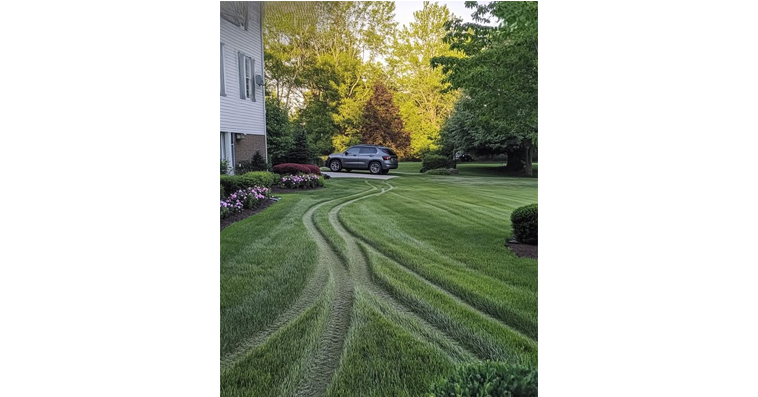After my divorce, I wasn’t looking for a new life—I was rebuilding the old one from scratch.
I bought a modest house tucked into a sleepy cul-de-sac in a new state. It had a white porch swing and a sun-faded mailbox, but the lawn… that was mine to love. My tiny plot of land became my therapy, my church, my battlefield of hope. I planted my late grandmother’s rose cuttings and surrounded the walkway with flickering solar lights. Saturday mornings, I mowed religiously with a secondhand mower I named “Benny,” sipping sweet tea on the porch steps like it was sacred ritual.
I was 30, heart-bruised, and desperately searching for peace in petunias and routine.
And then, like a rhinestoned hurricane, Sabrina blew in.
She lived at the far end of the loop, but you could hear her heels click halfway down the street. Always in stilettos. Always in lipstick. Always talking to someone on Bluetooth like she ran the world. Her Lexus was immaculate, her hair big, her presence… loud.
I didn’t think much of her—until the day tire tracks sliced straight through my lawn like a knife through sponge cake. I assumed it was a mistake. Maybe a delivery guy had taken the curve too wide.
But the next week, it happened again.
And again.
One morning, I got up early, armed with a cup of coffee and simmering suspicion—and there she was. Her SUV veered up and over the edge of my lawn like it was just more road to her. My flowerbed took the hit.
I waved her down, still in my pajama pants.
“Hey! Please don’t cut across! I just planted lilies!”
She rolled down the window, flashed a teeth-tight smile, and cooed, “Oh honey, your flowers will grow back. I’m just always in a rush.”
And then she peeled off, like that settled it.
I stood there, watching the crushed petals sway in her wake, feeling something inside me crumple alongside them. This yard wasn’t just grass—it was the only thing I’d managed to nurture after losing everything else. And she drove through it like it meant nothing.
I bought heavy decorative rocks, positioned them like a protective perimeter. She shoved two aside and left a mangled rose in their place.
That was the turning point.
If kindness didn’t work, creativity would.
I drove to the feed store, bought three rolls of chicken wire mesh, and spent an afternoon laying them just beneath the soil’s surface where her tires loved to roam. It was subtle. Legal. And surprisingly sharp under pressure.
Two mornings later, I heard the crunch. I didn’t have to look. Her SUV hissed with a punctured tire, and Sabrina leapt from the driver’s seat, heels stabbing into my mulch.
“What did you do to my car?!”
I sipped my tea, calm as a cat sunbathing.
“Oh no. Did you hit my lilies again?”
She stomped off, mascara smudged with rage. But she wasn’t done. A letter appeared on my door—lawyer-stamped and full of accusations. “Damage to shared property.” “Safety hazard.” I stared at the paper, stunned. Then I laughed.
And then I fought back.
I called the county. Booked a survey. Bright orange flags sprouted along the edge of my yard like proud little soldiers.
Turned out, she wasn’t just crossing the line. She was way over it.
I gathered evidence—photos, timestamps, her SUV mid-lawn, her heels poking through petunias like unwanted lawn gnomes. I made a folder thick with facts and mailed it to her lawyer with a simple note:
“Respect goes both ways.”
Three days later, her claim was dropped. But the drive-bys didn’t stop.
So I escalated.
I installed a motion-activated sprinkler designed to ward off deer—but with the force of a fire hose. I buried it just under the daisies, tested it (lost a flip-flop in the process), and waited.
She came, like clockwork.
The moment her tires touched my grass, the sprinkler erupted. Full blast. Her Lexus did a wet pirouette. Water exploded into her open passenger window. She shrieked, bolted from the car, and stood dripping in my lilies like a melting wax figure of herself.
I didn’t even pretend not to laugh. I cackled.
And just like that—she never drove across my lawn again.
A week later, a knock came at my door. It was her husband, Seth. Wrinkled shirt, tired eyes, holding a potted lavender plant like a white flag.
“She’s… spirited,” he said softly. “But you taught her a lesson I couldn’t.”
I took the plant and nodded. “Sidewalk’s always open.”
He walked away on the pavement, his steps oddly peaceful.
Weeks passed. My garden bloomed with more color than ever. The chicken wire came out. The sprinkler stayed—part symbol, part backup plan.
That lawn, once scarred with tire tracks, was whole again. So was I.
See, it was never just about flowers or boundary lines. It was about no longer allowing myself to be trampled just because someone else was in a hurry.
It was about choosing myself—every daisy, every rock, every sprinkler blast at a time.
It turns out, healing isn’t always soft. Sometimes it sprays. Sometimes it spikes. But if it helps you stand your ground?
Then it’s beautiful.



